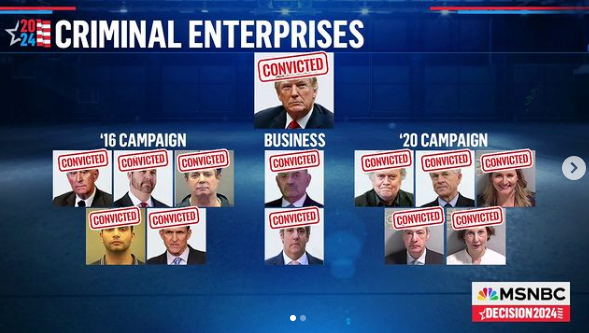In an era where truth often competes with sensationalism, the tale of an indicted felon demagogue who appeals his conviction by shifting the courtroom from a bench of impartial judges to the arena of public opinion is emblematic of the fragility of democratic systems. This narrative unfolds with a charismatic leader, convicted in the traditional sense, finding refuge in the court of popular vote—a general election—where the rules of evidence and decorum are supplanted by the volatile dynamics of mass persuasion.
The demagogue’s strategy is a masterclass in manipulation. Armed with disinformation and adept at stoking fear and hatred, he targets the electorate’s most vulnerable segments: the usually disengaged and less informed. These groups, often sidelined by the complexities of political discourse, become fertile ground for the seeds of deception. The demagogue crafts narratives that simplify and vilify, offering scapegoats for societal woes and promising the restoration of a bygone era of prosperity and security.
Central to his campaign is the dissemination of lies, seamlessly woven into speeches and amplified across digital platforms. The demagogue understands that repetition breeds familiarity, and familiarity can masquerade as truth. His messages resonate not because they are factual, but because they tap into deep-seated anxieties and offer easy solutions to complex problems. In this new courtroom, the jury is swayed not by logic or evidence, but by emotion and spectacle.
Financial incentives further taint this electoral process. The demagogue, leveraging his resources and connections, offers tangible rewards for support. In doing so, he reduces the sacred act of voting to a transactional exchange. This mercenary approach to democracy not only undermines the electoral process but also erodes the foundational trust that citizens place in their governance systems.
The implications of such a rigged jury are profound. Democracy, at its core, relies on an informed electorate making decisions based on truth and shared values. When these tenets are subverted by a campaign of lies and manipulation, the very essence of democratic governance is at risk. Public trust, already fragile in an age of skepticism and polarization, is further corroded, leaving citizens disillusioned and disengaged.
Moreover, the integrity of the electoral process suffers irreparable damage. When elections become battlegrounds for disinformation and fearmongering, the outcome reflects not the will of an enlightened populace, but the machinations of a cunning few. This distortion of democracy sets a dangerous precedent, where power is not earned through merit or vision, but seized through deceit.
In this cautionary tale, the indicted demagogue’s victory is not just a personal triumph but a societal tragedy. It serves as a stark reminder of the vulnerabilities inherent in democratic systems and the constant vigilance required to safeguard them. As citizens, the responsibility falls upon us to demand truth, question narratives, and uphold the principles that ensure our collective freedom and prosperity.
The story of a rigged jury underscores the need for robust mechanisms to counteract misinformation and promote media literacy. Only through an informed and engaged electorate can democracy fulfill its promise of representing the true will of the people. In resisting the allure of demagoguery, we reaffirm our commitment to a just and equitable society, where power is wielded not through manipulation, but through genuine service and accountability.
Electing a Convicted Felon
“heads I win; tails you cheated” -Donald J. Trump
In a world where misinformation can sway public opinion, it’s crucial to understand how to address the consequences when an electorate is misled, resulting in the election of a leader based on falsehoods.
False or misleading statements by Donald Trump
- Economy
- Immigration and crime
- Global warming and climate change
- Foreign policy
- Healthcare
- Abortion: Roe v. Wade
- Indictments
- Hurricane Helene
The AP fact-checked his speech, and reported that it included false statements about his presidency and administration’s accomplishments. These included statements that he passed the largest tax cuts in history; that the U.S. economy during his tenure was the greatest in U.S. history; that he achieved record job creation; that his administration rebuilt both the U.S. military and the American manufacturing industry; that he destroyed the ISIS caliphate; and a reiteration of his previously repeated falsehood that he, and not former President Barack Obama, had passed the Veterans Choice Act. These falsehoods added to the 30,573 falsehoods that The Washington Post‘s fact-checker had tallied by the end of Trump’s presidency, an average of 21 falsehoods a day.
When an electorate swallows lies and elects a leader on that basis, it poses significant challenges to democratic integrity. By promoting media literacy, encouraging critical thinking, fostering open dialogue, and holding leaders accountable, society can mitigate the impact of misinformation. Through collective effort and commitment to truth, trust in democratic processes can be restored, paving the way for a more informed and resilient citizenry.
Discover more from Hierarchical Democracy
Subscribe to get the latest posts sent to your email.
